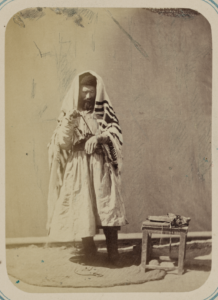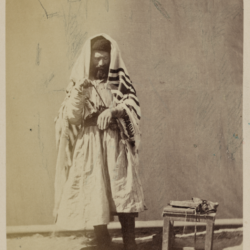In Jewish liturgy, some passages are dəvarim she-bi-qdushah, passages that require public communal prayer. Most famous among these are the Qaddish, Barkhu, and Qədushah. But people are not always able to pray in a community! In liturgical history both ancient and modern many different tashlumim (replacements) for these texts when praying individually have been suggested. The following is the Qədusha of Minḥah for an individual from Seder Rav ȝAmram, the oldest known full siddur. Much of the content of these tashlumim is from the hekhalot literature or the Gemara, often demonstrating girsaot not otherwise known.
Note: “The CAUSE” is used to translate the Divine Name YHVH, based on the philosophical idea of God as the Prime Mover and on the interpretation of the Name as a causative form of the copula – “causes to be.” This translation also uses the plural pronouns They/Their/Them to refer to God as a pluralis majestatis, and to avoid the implications of God being assigned a gender. (Find Ibn Ezra’s commentary on Genesis 1:1 for a discussion of the pluralis majestatis when referring to God.) All divine referents (pronouns, epithets, names) are rendered in unicase.
| Source (Hebrew) | Translation (English) |
|---|---|
בְּכׇל־יוֹם וָיוֹם בְּהַגָּעַת תְּפִלַּת הַמִּנְחָה מֶֽלֶךְ הָדוּר יוֹשֵׁב וּמְדַבֵּר לַחַיּוֹת. עַד־שֶׁלֹּא יָכְלָה הַדָּבָר מִפִּיו חַיּוֹת הַקֹּֽדֶשׁ יוֹצְאוֹת מִתַּֽחַת כִּסֵּא הַכָּבוֹד פִּיהֶם מָלֵא רִנָּה וְכַנְפֵיהֶם גִּילָה יְדֵיהֶם מְנַגְּנוֹת רַגְלֵיהֶם מְרַקְּדוֹת. וּמַקִּיפוֹת וְסוֹבְבוֹת אֶת־מַלְכָּם אַחַת מִיָּמִין וְאַחַת מִשְּׂמֹאל אַחַת מִלְּפָנָיו וְאַחַת מִלְּאַחֲרָיו. וּמְגַפְּפוֹת אוֹתוֹ וּמְנַשְּׁקוֹת אוֹתוֹ וּמִפְרְעוֹת פְּנֵיהֶם. הֵם מִתְפָּרְעוֹת וּמֶֽלֶךְ הַכָּבוֹד מְכַסֶּה פָּנָיו. וְהָיָה עֲרָבוֹת הָרָקִֽיעַ מִתְבַּקֵּֽעַ כִּכְבָרָה מִפְּנֵי הֲדַר זִיו יֹֽפִי תֹּֽאַר חֶמְדָּה חֶמְלָה תַּאֲוָה זֹֽהַר שֶֽׁבַח מַרְאֶה פְּנֵיהֶם כְּדָבָר שֶׁנֶּאֱמַר קָד֧וֹשׁ ׀ קָד֛וֹשׁ קָד֖וֹשׁ יְהֹוָ֣ה צְבָא֑וֹת מְלֹ֥א כׇל־הָאָ֖רֶץ כְּבוֹדֽוֹ׃ (ישעיה ו:ג) |
Each and every day when the Minḥah prayer arrives, the Splendid Sovereign sits and speaks with the beast-angels. Before the word can be completed from Their mouth, the holy beast-angels go out from under the Throne of Glory, their mouths full of cheer, and their wings celebration, their hands playing music, their legs dancing, and they encircle and surround their Sovereign, one to the right and one to the left, one to the front and one to the back. And they embrace Them and kiss Them and cover their faces — they cover themselves and the Glorious Sovereign covers Their face. And ȝAravoth, the [seventh] firmament, is split like a sieve before the splendid, radiant, beautiful, aesthetic, loving, merciful, desirous, bright, lauded appearance of their faces, as the word is said: “Holy, holy, holy is the Cause of Multitudes! All the earth is full of Their glory!” (Isaiah 6:3) [1] From Hekhalot Rabbati 13:4 |
וְהַמַּלְאָכִים כְּשֶׁהֵם מְזַמְּרִים נֶחֱלָקִים לְשָׁלֹשׁ שׁוּרוֹת שֶׁלְּאֶֽלֶף אַלְפֵי אֲלָפִים וּרְבָבוֹת. כַּת אַחַת אוֹמֶֽרֶת קָד֧וֹשׁ וְכוֹרַֽעַת וְנוֹפֶֽלֶת עַל־פָּנֶֽיהָ. כַּת אַחַת אוֹמֶֽרֶת קָד֧וֹשׁ ׀ קָד֛וֹשׁ וְכוֹרַֽעַת וְנוֹפֶֽלֶת עַל־פָּנֶֽיהָ. וְכַת אַחַת אוֹמֶֽרֶת קָד֧וֹשׁ ׀ קָד֛וֹשׁ קָד֖וֹשׁ יְהֹוָ֣ה צְבָא֑וֹת מְלֹ֥א כׇל־הָאָ֖רֶץ כְּבוֹדֽוֹ (ישעיה ו:ג) וְכוֹרַֽעַת וְנוֹפֶֽלֶת עַל־פָּנֶֽיהָ. וְהַחַיּוֹת מִתַּֽחַת כִּסֵּא הַכָּבוֹד עוֹנוֹת אַחֲרֵיהֶן וְאוֹמְרוֹת בָּר֥וּךְ כְּבוֹד־יְהֹוָ֖ה מִמְּקוֹמֽוֹ׃ (יחזקאל ג:יב) |
And the messenger-angels, when they hymn, are divided into three squadrons of thousands of thousands of thousands of myriads. One party says, “Holy!” and bows down and falls on its face. One party says, “Holy, holy!” and bows down and falls on its face. One party says, “Holy, holy, holy is the Cause of Multitudes! All the earth is full of Their glory!” (Isaiah 6:3) and bows down and falls on its face. And the beast-angels under the Throne of Glory answer after them and say, “Blessed be the Cause’s glory from its place!” (Ezekiel 3:12) [2] In some texts of Hekhalot Rabbati, found immediately prior to the previous passage. Not found in the Sefaria edition. |
וְאַתָּה בְּרַחֲמֶֽיךָ הָרַבִּים הָשֵׁב שְׁכִינָתָךְ לְצִיּוֹן כַּכָּתוּב בְּדִבְרֵי קׇדְשָׁךְ יִמְלֹ֤ךְ יְהֹוָ֨ה ׀ לְעוֹלָ֗ם אֱלֹהַ֣יִךְ צִ֭יּוֹן לְדֹ֥ר וָדֹ֗ר הַֽלְלוּ־יָֽהּ׃ (תהלים קמו:י) |
And may You in Your geat mercy return Your presence to Ẓion[3] Found in the extended version of the R’tseih from the Western rite. as is written in Your holy words: “The Cause will reign for eternity! Your God, o Ẓion, from generation to generation! Hallelujah!” (Psalms 146:10) |
Notes

“תשלום לקדושה שכ מנחה ליחיד (סדר רב עמרם) | Replacement for the Qədushah of Minḥah for an individual praying alone or without a minyan, from Seder Rav ȝAmram” is shared through the Open Siddur Project with a Creative Commons Attribution-ShareAlike 4.0 International copyleft license.




Leave a Reply